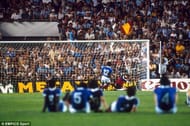The 2018 FIFA World Cup in Russia enters its final stretch this week with two enthralling semi-final matches taking place mid-week followed by the final at Luzhniki Stadium on Sunday. The World Cup that has already witnessed so many upsets is expected to have a similar climax as for the first time in World Cup history none among Brazil, Germany and Argentina will be featuring in the semi-finals.
France will go up against Belgium in the first semi-final on Tuesday and England will face Croatia on Wednesday in the second semi-final. The two thrilling semi-final encounters will be viewed by millions across the globe and promise to deliver the spectators with soul-stirring 90 minutes or more.
The World Cup since its inception way back in 1930 has witnessed a lot of iconic matches and if we talk about the best Semi-final match in World Cup history, it most definitely will be the semi-final game between West Germany and France at the 1982 World Cup in Spain.
Night of Seville (West Germany vs France)
The second semi-final of the 1982 World Cup between West Germany and France was played on 8th July in Seville at the Ramon Sanchez Pizjuan stadium. The two teams were fighting for a place at the final alongside eventual champions Italy who had won their semi-final match against Poland earlier in the day.
West Germany were without their captain, Karl-Heinz Rummenigge who was benched due to a hamstring injury. West Germany were nonetheless first to score as Pierre Littbarski scored at the 17th-minute mark to give his side the lead. Just 10 minutes later West German defender Bernd Forster was caught holding French center-forward Dominique Rocheteau inside the box which resulted in France being awarded a penalty, which was converted by French skipper Michel Platini.
The game saw a controversial challenge by West German goalkeeper Harald Schumacher on Patrick Battiston which led to some tension on the field in the second half. The game continued with Battiston taken off the field unconscious at the 60-minute mark. Several good chances were created on both sides in the remaining time but the score remained 1-1 after the regulation time which meant the players had to play two 15-minute periods of extra time. The first period of the extra time was off to a flying start as in the 92nd minute French centre-back Marius Tresor struck an 11-yard volley from just outside the box to put France ahead for the first time in the match.
With the scoreline 2-1 in favour of France, Rummenigge came in to replace Hans-Peter Breigel. However, it was France who scored once again at the 98-minute mark as midfielder Alain Giresse fired a first touch shot from 18-yards out into the goal to give his side a 3-1 advantage. It seemed as if France were all set to feature in their first ever FIFA World Cup final but West Germany had other plans.
About four minutes after conceding the third goal, West Germany began their comeback as skipper Rummenigge flicked home a volley to reduce the deficit to one goal and the first period of extra time ended with France leading 3-2. Three-minutes into the second period of extra time, West German centre-forward Klaus Fischer scored through a bicycle kick from six yards out to restore parity.

After 120-minutes the score was tied at 3-3 and the World Cup witnessed its first ever penalty shootout. The first two kicks were successfully converted by both West Germany and France but in the third round, Uli Stielike failed to score for West Germany. The subsequent kick taken by Rocheteau gave France a 3-2 lead. However, the fourth French penalty kick was blocked by Schumacher which was followed by Littbarski's successful kick from the spot that reignited West German hopes. In the fifth round both the skippers, Platini and Rummenigge scored and the shootout was tied at 4-4 which led to the sudden-death shooting.
In the sudden-death round, Maxime Bossis' shot was blocked and Horst Hrubesch scored to give West Germany the win and ensure them a place in the final against Italy. The game is regarded as one of the greatest World Cup encounters and French skipper Michel Platini considered it to be his "most beautiful game."
